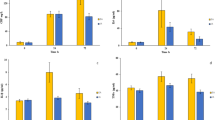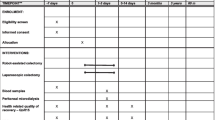Abstract
Background: We designed a study to evaluate the short- and long-term outcome of laparoscopic vs conventional colonic resection in a tumor-bearing small animal model.
Methods: We operated on male BD X rats (260–300 g), performing either laparoscopic (n= 9) or open colon resection (n= 9) in order to evaluate stress and immunological response to laparoscopic vs conventional colon resection. A third group (n= 9) underwent anesthesia only. Immediately before and after surgery, as well as at 1, 7, and 21 days postoperatively, a sample of 1 ml blood was taken from the retrobulbar venous plexus. Stress (corticosterone) and immune parameters (neopterine and IL-1β, IL-6) and body weight as a parameter of postoperative recovery were measured to identify short-term alterations. Long-term changes were evaluated in terms of survival time and at autopsy by measuring the tumor weight and the number of tumor infiltrated nodules (histology).
Results: The analysis of variance (ANOVA) showed significant differences between the three groups over a period of 1 week (p < 0.001 for corticosterone, p= 0.009 for neopterine, p= 0.04 for IL-1β, p= 0.024 for IL-6). Additionally, significant differences by t-test were found between the laparoscopic (minor alteration) and conventional (major alteration) group regarding corticosterone (p= 0.0015), neopterine (p= 0.0024), IL 1-β (p= 0.033), and IL-6 (p= 0.015) at the end of the operation. One week after the operation, the body weight was different depending on the type of operative procedure: 7 days postoperatively the rats lost 8% of their body weight after open surgery but only 4.3% after laparoscopic surgery. After anesthesia only, body weight increased by ∼4.8%. The medium survival time for the lap group was 44 days, whereas it was 44.1 days for the conventional group and 46 days for the anesthesia group (ANOVA p= 0.625). The number of nodules was 13.5 in the laparoscopic group 10.5 in the open group, and 7.4 in the anesthesia group, (ANOVA p= 0.119). The tumor weight was 6.8 g in the laparoscopic group, 6.4 g in the open group, and 5.04 g in the anesthesia group (ANOVA p= 0.874).
Conclusion: In a tumor-bearing small animal model, laparoscopic colon resection alters the stress and immune system less than open colon resection. This observation has no implications for the long-term results as measured by survival time and at autopsy. Therefore, laparoscopic colon resection has a short-term benefit and has no negative effect on long-term results compared to conventional operative procedures.
Similar content being viewed by others
Author information
Authors and Affiliations
Additional information
Received: 20 October 1999/Accepted: 15 December 1999/Online publication: 8 May 2000
Rights and permissions
About this article
Cite this article
Kuntz, C., Wunsch, A., Rosch, R. et al. Short- and long-term results after laparoscopic vs conventional colon resection in a tumor-bearing small animal model . Surg Endosc 14, 561–567 (2000). https://doi.org/10.1007/s004640000130
Published:
Issue Date:
DOI: https://doi.org/10.1007/s004640000130




